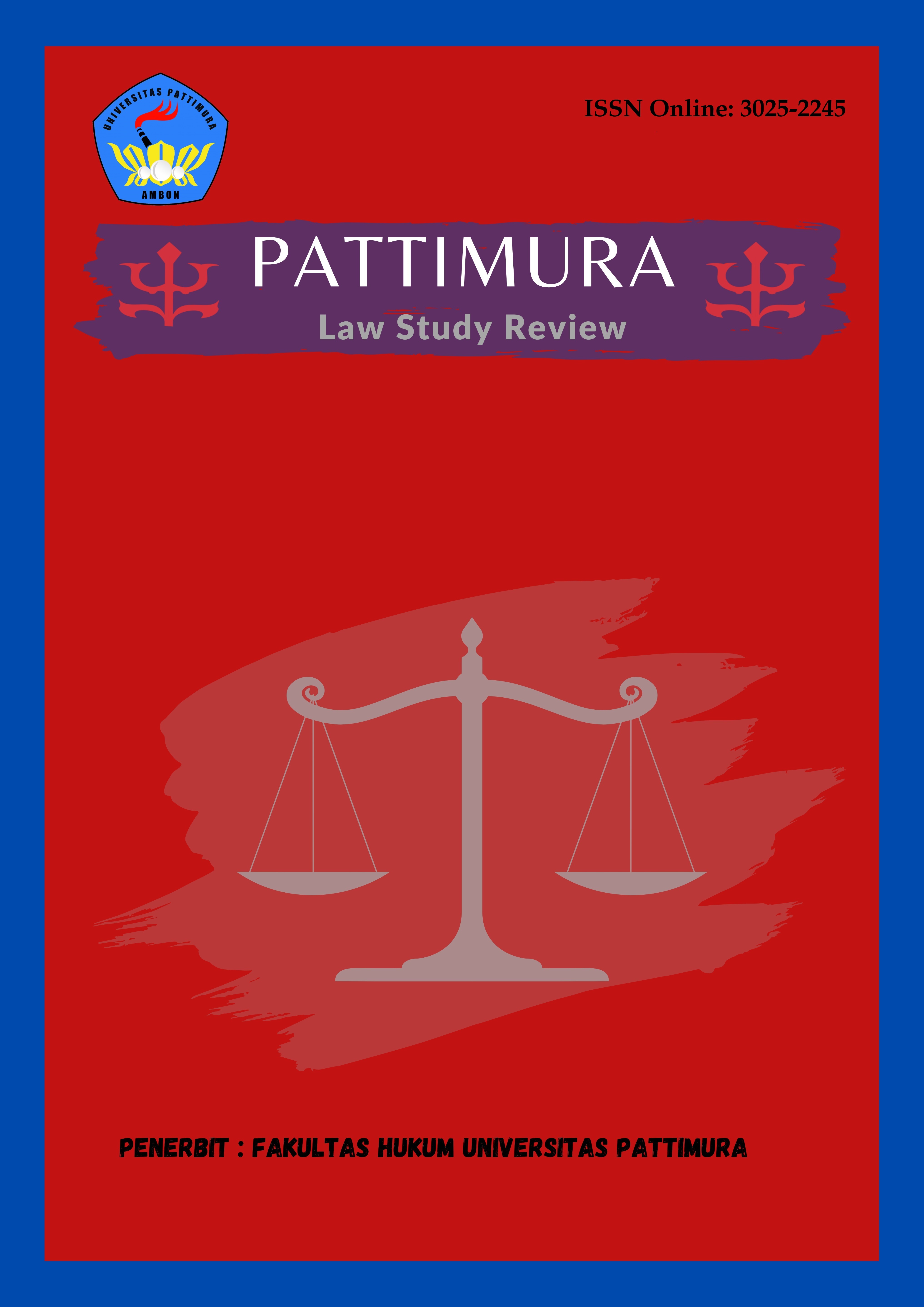Pola Pembinaan Narapidana Anak Oleh Lembaga Pembinaan Khusus Anak
Abstract
The government delegates the task of developing children to an organization called the Special Children's Correctional Institution (hereinafter referred to as LPKA). LPKA is a place to educate and guide children who are detained or have committed violations of the law. Forms of guidance for child prisoners at LPKA Class II Ambon include: personality development, skills development, and formal and non-formal education. So, through the coaching carried out, it is hoped that when the child returns to society, the child will have self-confidence and will always have the energy to act positively. However, based on the reality in LPKA Class II Ambon, through the existing forms of coaching, there is still no influence on the results of coaching the target children, because when the children return to society, the children do not have self-confidence and no energy to act positively. The legal research method used is normative legal research or library legal research, this is legal research that examines document studies, namely using various primary legal materials such as statutory regulations, court decisions, legal theories, and can be in the form of expert opinions. From the results of research conducted by researchers using conceptual and statutory approaches, the results concluded are that in the problem of coaching patterns at the Ambon Class II Special Child Development Institute (LPKA) it can be said that there is significantly no influence when children return to living their lives in social environment of society. The factors that hamper the implementation of training for child prisoners at LPKA are: LPKA facilities do not fully support the pattern of training for children of prisoners, such as limited skills space, lack of skills tools, lack of tables and chairs.
Downloads
References
Arfa Dkk, Pola Pembinaan Terhadap Narapidana Seumur Hidup Dalam Kebijakan Implementasinya”, Jurnal Sains Sosio Humaniora, Vol.3, No.2,(2019), 252, URL: https://repository.unja.ac.id/id/eprint/18328
Fitriani Rahma Eka, Pembinaan Terhadap Narapidana Anak Di Lembaga Pembinaan Khusus Anak (LPKA), Jurnal Justitiable, Vol.6, No.1, (2023): 111, URL: https://www.google.co.id/search?q=Pembinaan+Terhadap+Narapidana+Anak+Di+Lembaga+Pembinaan+Khusus+Anak+(LPKA)
Patty Merry, Dessy Hehanussa, and Hadibah Wadjo, Urgensi Laporan Penelitian Kemasyarakatan Dalam Penjatuhan Pidana Bagi Anak Pelaku Tindak Pidana, Pattimura Legal Journal, Vol. 1, No.2, (2022), 101, DOI: https://doi.Org/10.47268/pela.v1i26392
Pranada Komang Angga Dkk, Perlindungan Hukum, Hak-Hak Narapidana Anak Di Lembaga Pembinaan Khusus, Jurnal Preferensi Hukum, Vol. 2, No.3 (2021), 517, DOI: https://doi.org/10.22225/jph.2.3.3993.513-518
Racmawati Yulia Nur Dkk, Peran Pendidikan Luar Sekolah Dalam pembinaan Narapidana Anak Di Lembaga Pemasyarakatan Kelas IIA Jember, Learning community, Jurnal Pendidikan Luar Sekolah, vol.1, no.1, (2018): 18, URL: https://core.ac.uk/download/pdf/154914381.pdf
Wati Emy Rosna, Penanganan Anak Yang Berkonflik Dengan Hukum. Jurnal Penanganan Anak Yang Berkonflik Dengan Hukum, Vol.1 No.2, (2017), 285, DOI: 10.30651/justitia.v1i2.1162
Widodo Guntarto, Sistem Pemidanaan Anak Sebagai Pelaku Tindak Pidana Perspektif Undang-Undang Nomor 11 tahun 2012 Tentang Sistem Peradilan Pidana Anak, Jurnal Surya Kencana Dua: Dinamika Masalah Hukum dan Keadilan, 6 no.1, (2016), 65, URL: https://jdihn.go.id/files/414/339-547-1-SM.pdf
Buku
Marbun Rocky, Sistem peradilan pidana Indonesia, Malang: Setara Press, 2015.
Marzuki Peter Mahmud, Penelitian Hukum, Jakarta: Kencana, 2005.
Tahir Muhammad Rachmad, Sistem Peradilan Pidana Anak Konflik Hukum Yang Melewati Batas Umur, Gorontalo: Cahaya Arsh Publisher & Printing, 2023.
Tyas D.C, Hak dan Kewajiban Anak, Jakarta: ALPRIN, 2019.
Website
http://repository.umy.ac.id/handle/123456789/9200?show=full
https://era.id/amp/120286/mengenal-lembaga-pembinaan-khusus-anak
https://youtu.be/0af-6mVSykg?si=hRYO4E02Xua23dh7
https://lpkaambon.kemenkumham.go.id/beri
Copyright (c) 2025 Lela Sari Roroa, Elsa Rina Maya Toule, Denny Latumaerissa (Author)

This work is licensed under a Creative Commons Attribution-NonCommercial 4.0 International License.
Authors who publish their manuscripts in this Journal agree to the following conditions:
- The copyright in each article belongs to the author, as well as the right to patent.
- Authors are able to enter into separate, additional contractual arrangements for the non-exclusive distribution of the journal's published version of the work (e.g., post it to an institutional repository or publish it in a book), with an acknowledgment of its initial publication in this journal.
- Authors are permitted and encouraged to post their work online (e.g., in institutional repositories or on their website) prior to and during the submission process, as it can lead to productive exchanges, as well as earlier and greater citation of published work.
- Authors have the right to self-archiving of the article (Author Self-Archiving Policy)













